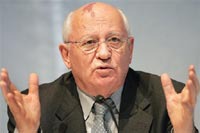Happy birthday, Mr. Former President of the USSR!
 Russians become more and more indifferent to Mikhail Gorbachev, the first and the last President of the USSR, who is celebrating his 80th anniversary on March 2, 2011. Positive aspects of his rule do not outweigh the negative attitude that most Russians were having in the past because of the reign of chaos in the country. Nowadays, many people believe that Gorbachev was incapable of finishing his beginnings. The majority of Russians believe that it is Gorbachev who orchestrated the collapse of the Soviet Union.
Russians become more and more indifferent to Mikhail Gorbachev, the first and the last President of the USSR, who is celebrating his 80th anniversary on March 2, 2011. Positive aspects of his rule do not outweigh the negative attitude that most Russians were having in the past because of the reign of chaos in the country. Nowadays, many people believe that Gorbachev was incapable of finishing his beginnings. The majority of Russians believe that it is Gorbachev who orchestrated the collapse of the Soviet Union.

These are the results of the poll, conducted by the Russian Public Opinion Research Center (VCIOM).
Gorbachev was born on March 2, 1931 in the settlement of Privolnoye, the Stavropol region of Russia. On March 11, 1985, he took the highest post in the Soviet Union - the General Secretary of the Central Committee of the Communist Party of the Soviet Union. In March of 1990, the Congress of People's Deputies elected Gorbachev the President of the USSR.
The name of Mikhail Gorbachev is internationally associated with such vague notions as glasnost and perestroika. Nowadays, it is still hard to find an answer to the question of what was happening to the country during those years. Mr. Gorbachev himself says that he was doing his best, he was struggling as hard as he could to preserve the Soviet Union.
At the same time, the first President of the USSR claims that he began to develop a negative attitude to the Soviet regime in 1937, after his grandfather had been arrested. It is worthy of note that Gorbachev's grandfather was acquitted and released in 1938.
Alexander Yakovlev, the architect of perestroika, was much more open-minded in his remarks after the break-up of the USSR. "Looking back, I can proudly say that the sophisticated, but very simple tactics - the mechanism of totalitarianism against the system of totalitarianism has worked," he said.
Alexander Yakovlev was a high ranking official in the Communist Party. When serving as a member of the Political Bureau, he was also employed at the propaganda department of the party. He was supervising the entire Soviet press, TV, as well as ideological bodies of the party.
Recollecting the Soviet period of his political experience, Yakovlev wrote that he was developing the plan of the ideological attack against the Soviet regime with this closest friends and associates.
"A group of true, not sham, reformers developed (verbally, of course), the following plan. To strike Stalinism with Leninism. In case of success, one should use social democracy and Plekhanov's ideology to attack Leninism, liberalism and moral socialism. To attack revolutionarism in general. It was a new stage in exposing Stalin's personality cult, albeit without Khrushchev's emotions. We had the following message: it was not only Stalin who was the criminal, the whole system was criminal. "
"For example, my works and speeches of 1987-1988 and partially of 1989 were redundant with Marx's and Lenin's quotes," Yakovlev said ironically.
The above-mentioned confessions reflect nothing but the intention to destroy the Soviet Union. Could the head of state be unaware of the plans of his deputy, associate and friend? Unfortunately, there is no answer to this question.
The fact remains: the population of modern-day Russia treats Mikhail Gorbachev either indifferently or negatively. The number of those, whom Gorbachev annoys, reduced during the recent decade from 30 percent in 2001 to 20 percent in 2011. The number of those who sympathize with the former Soviet president reduced as well - from 16 to 5 percent. Indifference prevails: 47 percent of the polled said that they were indifferent to the former leader of the Soviet Union (vs. 25 percent in 2001).
Seventy-three percent of the polled said that it was hard for them to evaluate positive aspects of Gorbachev's rule. Ten percent of respondents positively estimated his achievements in introducing democratic freedoms and the rights for business activities. Five percent of people acknowledge Gorbachev's contribution in ending the Cold War.
As for negative actions and consequences, people recollect the collapse of the USSR (31 percent), the setback in the country (5 percent), chaos (3 percent), the ticket system on food, the sale of the nation to the West, the incapability to finish the beginnings (2 percent).
On the one hand, one may say that Russians do not have the strongly negative attitude to Gorbachev 20 years after the breakup of the superpower. On the other hand, Gorbachev's image of a politician was undermined as he appeared in commercial projects to advertize pizza and Louis Vuitton bags. He even joined one of Russia's most prominent rock musicians, Andrei Makarevich, to record a music CD together.
Mikhail Gorbachev still appears in the news today, but it mostly happens owing to his visits abroad. He took part in the festivities to celebrate the fall of the Berlin Wall, he delivered a speech at the American University in Turkey, George H. Bush congratulated him in his 80th anniversary, mass media wonder whether Queen Elizabeth II is going to attend the birthday party of the former Soviet president.
By the way, the party to celebrate Mr. Gorbachev's 80th birthday is going to take place in London, not Moscow.
Valeria Novodvorskaya, a Russian liberal activist, wrote: "Our Gorby has eventually become a good German and a tolerable American - in other words, a European."
Nothing to add, nothing to cut.
Dmitry Lyskov
Pravda.Ru
Subscribe to Pravda.Ru Telegram channel, Facebook, RSS!


